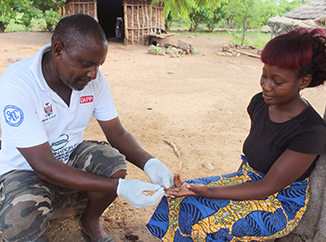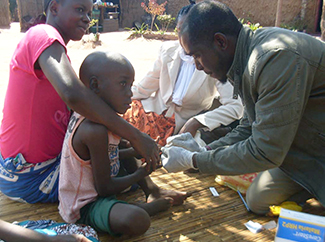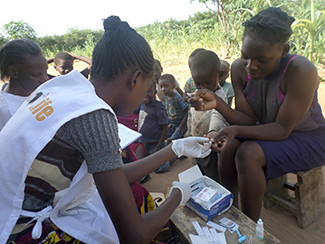consent_cookie
Duración: 1 year
Stores the user's cookie consent state
25-04-2019
Malaria remains one of the infectious diseases with the greatest impact on communities in developing countries. According to the World Health Organization, only in 2017 was the death of 435,000 people worldwide, -2 out of every 3 were under five years old, and 9 out of 10 lived in sub-Saharan Africa - out of 219 million cases detected.
Malaria is caused by a parasite called Plasmodium that is transmitted through the bite of infected mosquitoes. Among the symptoms of malaria are fever, headaches and vomiting, which usually appear 10 to 15 days after the mosquito bite. If not treated quickly, it can endanger the life of the patient in a short time, as it alters the blood supply to vital organs.
As malaria does not respect boundaries, certain countries face serious problems in controlling the disease within their own borders, hence the need for cross-border cooperation, as being developed by the Elimination 8 programme in Southern Africa, of which the current project forms part.
Since May 2017, ADPP-Angola has been leading a consortium comprising the Mentor Initiative and the Council of Christian Churches with JC Flowers Foundation in Angola, and DAPP-Namibia and the Anglican AIDS Programme in Namibia. The aim of the project is to contribute to the elimination of malaria in Namibia by 2020 and to the pre-elimination of malaria in Angola. Due to conclude on 30 September 2018, the project received an extension until 31 March 2019.
Control and prevention are being achieved by testing, treating and tracking malaria cases along the Angola-Namibia border. This is an area that sees considerable movement of people, where settlements are disperse, access difficult and health services few and far between. To overcome these problems, the project installed seven purpose-built and equipped health posts in Angola and one in Namibia in the most populated zones of the implementation area, and established two basic mobile units in Namibia and one in Angola to serve more remote areas. In addition to the health posts, four teams of trained personnel undertook surveillance tasks. Surveillance has been important for the detection and monitoring of malaria cases, and essential to prevent unexpected outbreaks or transmission.
By the end of 2018, 256,270 people had been tested for malaria in Angola and 76,058 in Namibia, with 27,300 positive cases in Angola and 5,705 in Namibia. The most recent figures were, however, more encouraging in that there was a decrease of positive cases of almost 80% in all areas where the project was implemented. Throughout the project, treatment was offered to all those who tested positive and resulted in 99% of all confirmed cases being treated, with severe cases being referred to the nearest municipal hospital. Several factors played a role in achieving the above results, not least the demand generation in the community.
During 2018, the project made around 100,000 household visits in Angola and 10,000 in Namibia, organized 48 Malaria Days, gave talks in schools and churches, made radio broadcasts, mobilized traditional and religious leaders, distributed thousands of flyers and posters and commemorated World Malaria Day.


